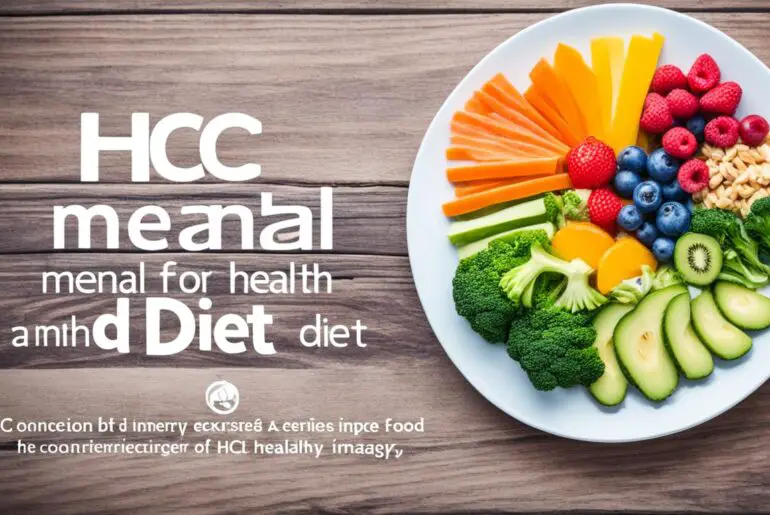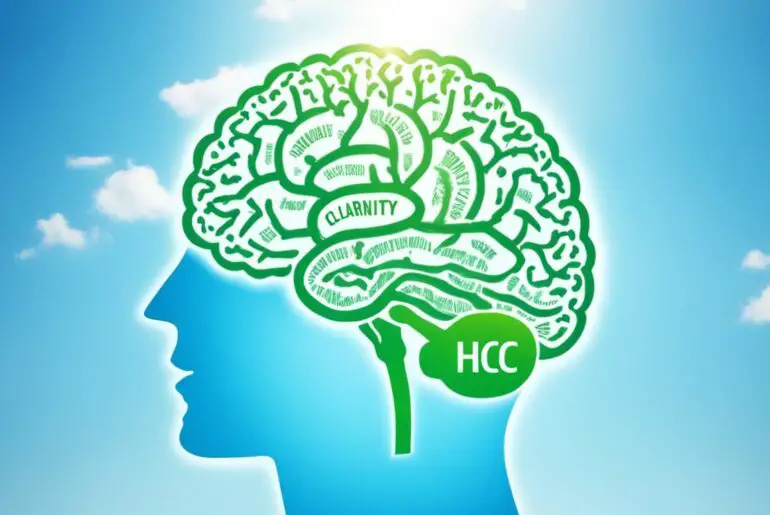Did you know that the HCG diet, a popular weight loss method, can have profound psychological effects on individuals? The severe calorie restriction and rapid weight loss associated with this diet can impact mental well-being, emotional health, and behavior modification.
The HCG diet, which involves severe calorie restriction and the use of the hormone human chorionic gonadotropin (HCG), has gained attention, but it is not approved or proven safe and effective for weight loss by the Food and Drug Administration (FDA). Severe calorie restriction can lead to short-term weight loss, but it also carries risks such as gallstone formation, irregular heartbeat, nutrient deficiencies, and electrolyte imbalances. The HCG diet has been associated with side effects like fatigue, irritability, depression, fluid buildup, and blood clot formation.
So, let’s delve deeper and explore the psychological impact of the HCG diet and why it’s essential to prioritize mental well-being during weight loss journeys.
Key Takeaways:
- The HCG diet can have significant psychological effects on individuals due to severe calorie restriction and rapid weight loss.
- Side effects of the HCG diet may include fatigue, irritability, depression, fluid buildup, and blood clot formation.
- Mental well-being plays a crucial role in successful and sustainable weight loss.
- Seeking professional guidance and addressing psychological factors can contribute to positive outcomes in weight loss goals.
- There are safer alternatives to the HCG diet that focus on long-term lifestyle changes for weight management.
How Does the HCG Diet Work?
The HCG diet combines severe calorie restriction, typically around 500 to 800 calories per day, with the use of HCG hormone injections or supplements. The theory behind the diet is that HCG can boost metabolism, suppress appetite, and promote fat loss. However, scientific evidence does not support these claims. Most studies have found that the weight loss achieved on the HCG diet is primarily due to the extreme calorie restriction, not the HCG hormone itself. The diet also includes behavior modification techniques to promote long-term weight loss.
Psychological Effects of the HCG Diet
The HCG diet can have significant psychological effects on individuals. The severe calorie restriction and rapid weight loss associated with the diet can lead to changes in body image and self-esteem. When following the HCG diet, some people may experience mood changes, including irritability, restlessness, and depression. The restrictive nature of the diet may also cause feelings of deprivation and frustration, leading to emotional distress.
It is crucial to consider the potential psychological impact of the HCG diet before embarking on it. The weight loss journey can be emotionally challenging, and the extreme measures of the HCG diet may exacerbate these challenges. It is important to prioritize mental well-being and emotional health throughout the process.
| Psychological Effects of the HCG Diet | Impact |
|---|---|
| Changes in body image | Individuals may experience changes in how they perceive their body due to the rapid weight loss and physical transformation. |
| Impact on self-esteem | The severe calorie restriction and the pressure to adhere strictly to the diet can affect an individual’s self-esteem and self-worth. |
| Mood changes | Some people may experience mood swings, including irritability, restlessness, and depression, as a result of the extreme dieting. |
| Feelings of deprivation and frustration | The restrictive nature of the HCG diet can cause feelings of deprivation and frustration, which may lead to emotional distress. |
It is essential to approach the HCG diet with caution, considering both the physical and psychological implications. Consulting with a healthcare provider or registered dietitian can provide valuable guidance and support in managing these psychological effects and ensuring overall well-being.
Risks and Side Effects of the HCG Diet
The HCG diet carries various risks and side effects that individuals should be aware of before starting this weight loss method. Severe calorie restriction, a key component of the HCG diet, can lead to several complications and health concerns.
Gallstones
One of the risks associated with the HCG diet is an increased likelihood of gallstone formation. The body requires sufficient dietary fat to process bile properly, and without it, the risk of gallstone development is heightened.
Irregular Heartbeat
Additionally, severe calorie restriction can have an impact on heart health, potentially leading to irregular heartbeats. It is important to consider the potential risks to cardiovascular health when embarking on the HCG diet.
Nutrient Deficiencies
The HCG diet’s severe calorie restriction may result in nutrient deficiencies due to inadequate intake of essential vitamins and minerals. As a result, individuals on this diet may suffer from deficiencies that can have negative effects on overall health.
Blood Clots
Another potential risk associated with the HCG diet is the formation of blood clots, which can block blood vessels and be life-threatening. It is essential to be aware of this risk and discuss it with a healthcare provider before starting the HCG diet.
Other Side Effects
In addition to these major risks, the HCG diet has been reported to cause other side effects such as fatigue, fluid retention, and swelling of the breasts in males. These side effects can vary in severity from individual to individual.
Before undertaking any drastic weight loss methods like the HCG diet, it is important to consult with a healthcare provider to discuss the potential risks and side effects. They can help determine if the diet is suitable for individual needs and advise on alternative approaches that may be safer and more effective.
The Importance of Mental Well-being during Weight Loss

Losing weight is not just about physical changes; it also has a significant impact on our mental and emotional well-being. Weight loss journeys can be challenging, often accompanied by various psychological effects that need careful attention. It is essential to prioritize your emotional health and psychological well-being throughout the process.
The extreme calorie restriction and rapid weight loss associated with the HCG diet can add additional stress and strain on your mental health. The drastic changes in your eating habits and body composition can impact your mindset and emotional state.
During weight loss, it is normal to experience a range of emotions, such as frustration, impatience, and self-doubt. It is essential to acknowledge these feelings and develop strategies to cope with them effectively. Seeking support from friends, family, or professionals can provide valuable guidance and encouragement as you navigate through this transformative journey.
Practicing self-care is crucial during weight loss. Engaging in activities that promote relaxation, such as deep breathing exercises, meditation, or taking a walk in nature, can help reduce stress and anxiety levels. Prioritizing sleep, adequate rest, and engaging in hobbies or activities that bring you joy can also contribute to your overall emotional well-being.
“Taking care of your mental well-being during weight loss is just as important as taking care of your physical health. By addressing your emotional needs, you can create a sustainable and fulfilling journey towards a healthier you.” – Dr. Lisa Johnson
Another important aspect of maintaining mental well-being during weight loss is focusing on adopting a healthy and positive mindset. Challenging negative self-talk, practicing self-compassion, and setting realistic goals can help cultivate a healthy relationship with yourself and your body.
Remember, mental well-being is not an isolated aspect of your overall health; it interconnects with your physical well-being and can influence the success of your weight loss journey. By prioritizing your emotional health and developing healthy coping strategies, you can achieve long-term success in reaching your weight loss goals.
The Psychological Impact of Weight Loss
Weight loss can have a profound psychological impact, affecting various aspects of our lives. Improvements in body image, self-esteem, and mood are common psychological benefits experienced by many individuals who successfully lose weight. However, it is essential to note that everyone’s experience may differ.
Some individuals may find that weight loss brings about increased self-confidence and a positive body image. They may feel more comfortable in their own skin and have a renewed sense of self-worth. Additionally, achieving weight loss goals can boost self-esteem and provide a sense of accomplishment.
However, it is also essential to recognize that weight loss may not automatically resolve all underlying emotional issues. Emotional health should be nurtured alongside physical health, and seeking professional support when needed can be beneficial. Therapists and counselors can help address any underlying psychological concerns and provide guidance on maintaining a healthy mindset throughout the weight loss journey.
In conclusion, prioritizing your mental well-being during weight loss is crucial for a sustainable and positive journey. By seeking support, practicing self-care, and adopting a healthy mindset, you can navigate the emotional challenges that come with losing weight and ultimately achieve a healthier and happier you.
Safer Alternatives to the HCG Diet
If weight loss is your goal, there are safer and more sustainable alternatives to the HCG diet. Instead of resorting to extreme calorie restriction and unproven hormone therapy, focus on adopting a balanced diet and incorporating regular exercise into your routine. By making these lifestyle changes, you can achieve gradual and sustainable weight loss while prioritizing your overall health.
A balanced diet is key to achieving long-term weight loss success. Make sure to include a variety of nutritious foods such as fruits, vegetables, whole grains, lean proteins, and healthy fats. By nourishing your body with the right nutrients, you can support your overall well-being and encourage healthy weight loss.
In addition to a balanced diet, regular exercise is essential for maintaining a healthy weight. Aim for at least 150 minutes of moderate-intensity aerobic activity or 75 minutes of vigorous-intensity activity each week. This can include activities such as brisk walking, cycling, swimming, or dancing. Regular exercise not only helps you burn calories but also improves cardiovascular health, boosts mood, and promotes overall well-being.
When seeking weight loss alternatives, it’s important to consult with a healthcare provider or a registered dietitian. They can help develop a personalized weight loss plan that takes into account your individual needs, goals, and health conditions. By working with a healthcare professional, you can ensure that your weight loss journey is safe, effective, and tailored to your specific circumstances.
Remember, sustainable weight loss is a gradual process that requires long-term lifestyle changes. Avoid falling for quick-fix diets like the HCG diet, which may offer temporary results but can be detrimental to your health in the long run. Instead, focus on making healthy choices, prioritizing balanced nutrition, and staying physically active. By adopting these safer alternatives, you can achieve your weight loss goals while improving your overall well-being.
Benefits of Safer Weight Loss Methods:
- Gradual and sustainable weight loss
- Improved overall health and well-being
- Reduced risk of nutrient deficiencies and electrolyte imbalances
- Better cardiovascular health
- Increased energy levels and improved mood
It’s time to prioritize your health and choose safe weight loss methods that promote your well-being. By incorporating a balanced diet, regular exercise, and professional guidance into your weight loss journey, you can achieve lasting results and maintain your transformed physique for years to come.
Addressing Psychological Factors in Weight Loss

When it comes to weight loss, addressing psychological factors is essential for long-term success. Emotional eating, stress, and negative body image can all impact our efforts to achieve our weight loss goals. By understanding and addressing these factors, we can develop strategies to overcome them and create a healthier relationship with food and ourselves.
Managing Emotional Eating
One common psychological factor that can hinder weight loss progress is emotional eating. This is when we turn to food for comfort or as a coping mechanism for stress, sadness, or other emotional triggers. To address emotional eating, it’s important to cultivate awareness of our emotions and their connection to food. Practicing mindfulness techniques, such as deep breathing and meditation, can help us pause and make conscious choices when it comes to eating. Seeking support from a therapist or counselor who specializes in emotional eating can also be beneficial in understanding and overcoming this pattern.
Stress Management for Weight Loss
Stress is another psychological factor that can adversely affect our weight loss efforts. When we’re stressed, our bodies release cortisol, a hormone that can lead to increased appetite and cravings for high-calorie foods. Finding healthy ways to manage stress is crucial for successful weight loss. Engaging in regular exercise, practicing relaxation techniques like yoga or tai chi, and prioritizing self-care activities such as taking baths or enjoying hobbies can all help reduce stress levels. It’s also important to identify and address underlying causes of stress in our lives, whether it be work-related, relationship-based, or other factors.
Building a Positive Body Image
Negative body image can have a significant impact on how we approach weight loss. When we view our bodies in a negative light, it can lead to unhealthy behaviors such as extreme dieting or excessive exercise. To promote a positive body image, we should focus on self-acceptance and self-care. This involves practicing self-compassion, celebrating our bodies for what they can do, and surrounding ourselves with positive influences. Sometimes, seeking support from a therapist or joining body-positive communities can help reshape our perspectives and create a healthier mindset.
Developing Healthy Coping Mechanisms
Many of us turn to food as a way to cope with challenging emotions. To address this, it’s important to develop alternative, healthier coping mechanisms. Engaging in activities we enjoy, such as reading, painting, or listening to music, can provide a sense of comfort and relaxation. Seeking support from friends, family, or support groups can also help alleviate stress and provide a space to express our feelings. By replacing emotional eating with healthier coping mechanisms, we can create a more balanced approach to weight loss.
In conclusion, addressing psychological factors is crucial for successful weight loss. By managing emotional eating, practicing stress management techniques, building a positive body image, and developing healthy coping mechanisms, we can create a solid foundation for long-term weight loss success. Remember, seeking support from professionals, such as therapists or dietitians, can be incredibly beneficial on this journey.
The Role of Hormonal Changes in Weight Loss
Hormonal changes can have a significant impact on weight loss and weight management. Our hormones, such as insulin, leptin, and ghrelin, play a crucial role in regulating appetite, metabolism, and energy balance.
When these hormones are imbalanced, it can lead to difficulties in losing weight or maintaining a healthy weight. Insulin, for example, is responsible for regulating blood sugar levels and promoting fat storage. An imbalance in insulin levels can hinder weight loss efforts.
Leptin, often referred to as the “satiety hormone,” signals to the brain when we’re full. If there’s a leptin imbalance, it can interfere with our body’s ability to recognize when we’ve had enough food, leading to overeating.
Ghrelin, on the other hand, is known as the “hunger hormone” because it stimulates appetite. An increase in ghrelin levels can make us feel more hungry and may lead to overconsumption of calories.
In some cases, hormone therapy may be beneficial for individuals with hormone imbalances that affect weight. Under the guidance of a healthcare provider, hormone therapy can help restore hormonal balance and improve the body’s ability to lose weight effectively.
The Risks and Benefits of Hormone Therapy
While hormone therapy can be a helpful tool in weight loss, there are risks and considerations to keep in mind. It’s crucial to approach hormonal interventions with caution and to consult with a qualified healthcare provider before starting any hormone therapy.
Hormone therapy should always be tailored to an individual’s specific needs and should never be pursued without professional guidance. Proper monitoring and regular check-ups are essential to ensure safety and effectiveness.
It’s worth noting that hormone therapy may not be suitable for everyone seeking to lose weight. A comprehensive evaluation of an individual’s overall health, medical history, and hormonal profile should be conducted to determine if hormone therapy is an appropriate course of action.
In some cases, lifestyle modifications, such as dietary changes, exercise, stress management, and quality sleep, may be sufficient to support healthy hormonal balance and promote weight loss. A healthcare provider or registered dietitian can provide guidance on lifestyle adjustments that can positively impact hormonal health.
The Importance of Metabolic Changes
In addition to hormonal imbalances, metabolic changes can also influence weight loss. Metabolism refers to the processes by which our bodies convert food into energy.
Factors such as age, genetics, body composition, and activity levels can impact metabolic rate. As we age, our metabolism naturally slows down, making it more challenging to lose weight.
Fortunately, there are ways to support and enhance our metabolism to facilitate weight loss. Regular exercise, especially strength training, can help increase muscle mass and boost the metabolic rate.
Eating a well-balanced diet that includes a variety of nutrient-rich foods can also help support a healthy metabolism. Certain foods, such as spicy foods and those rich in protein, can temporarily increase metabolic rate through the thermic effect of food.
It’s essential to approach weight loss holistically, considering both hormonal and metabolic factors. By addressing imbalances and making appropriate lifestyle modifications, individuals can optimize their chances of successful weight loss and long-term weight management.
Seeking Professional Guidance for Weight Loss

When it comes to embarking on a weight loss journey, seeking professional guidance is of utmost importance. Healthcare providers and registered dietitians can provide the expertise, personalized recommendations, and support needed to navigate the complex world of weight loss. They have the knowledge and experience to take into account individual health needs, goals, and preferences, ensuring the development of a safe and effective weight loss plan.
Through thorough assessments and consultations, healthcare providers and registered dietitians can create a tailored weight loss approach that factors in various considerations such as medical history, dietary restrictions, and lifestyle. This personalized approach increases the likelihood of sustained success in achieving weight loss goals.
In addition to developing a comprehensive weight loss plan, healthcare providers and registered dietitians can monitor progress, offer ongoing guidance and education, and address any concerns or challenges that arise along the way. They provide accountability and support, acting as a valuable resource throughout the weight loss journey.
Participating in evidence-based weight loss programs or support groups can also be beneficial when seeking professional guidance. These programs and groups offer a structured environment that fosters motivation, encouragement, and accountability. They provide a sense of community and a platform to share experiences, insights, and strategies with like-minded individuals.
Benefits of Professional Guidance for Weight Loss:
- Personalized recommendations and support
- Credible and evidence-based guidance
- Monitoring progress and adjusting strategies as needed
- Education on nutrition and behavior modification
- Addressing underlying medical conditions or concerns
- Increased accountability and motivation
- Access to structured weight loss programs and support groups
When embarking on a weight loss journey, I highly encourage seeking the expertise of healthcare providers and registered dietitians. They can provide the professional guidance needed to make informed decisions, overcome challenges, and ultimately achieve long-term weight loss success.
Conclusion
The HCG Diet, a weight loss method that combines severe calorie restriction with the use of the hormone HCG, can have significant psychological effects on individuals. The extreme dieting and rapid weight loss often associated with the HCG Diet can impact body image, self-esteem, and mood. It is crucial to prioritize mental well-being during weight loss journeys and consider safer alternatives that focus on long-term lifestyle changes.
Seeking professional guidance from healthcare providers and registered dietitians can provide personalized recommendations and support, ensuring safety and effectiveness in weight loss goals. Practicing self-care, developing healthy coping mechanisms, and addressing psychological factors such as stress or emotional eating can contribute to successful and sustainable weight loss while promoting mental well-being.
Remember, a balanced diet, regular exercise, and a positive mindset are key to achieving long-term weight loss and overall well-being. By focusing on your mental well-being while embarking on your weight loss journey, you can achieve your goals in a healthier and more sustainable manner.
FAQ
What is the HCG Diet and how does it work?
The HCG diet involves severe calorie restriction and the use of the hormone human chorionic gonadotropin (HCG). The theory behind this diet is that HCG can boost metabolism, suppress appetite, and promote fat loss. However, scientific evidence does not support these claims. Most studies have found that the weight loss achieved on the HCG diet is primarily due to the extreme calorie restriction, not the HCG hormone itself. Behavior modification techniques are also included to promote long-term weight loss.
What are the psychological effects of the HCG Diet?
The severe calorie restriction and rapid weight loss associated with the HCG diet can have significant psychological effects. It can lead to changes in body image and self-esteem. Some people may experience mood changes, including irritability, restlessness, and depression. The restrictive nature of the diet may also cause feelings of deprivation and frustration, leading to emotional distress.
What are the risks and side effects of the HCG Diet?
The HCG diet carries various risks and side effects. Severe calorie restriction can increase the risk of gallstone formation, irregular heartbeat, and nutrient deficiencies. There is also a potential risk of blood clot formation, which can be life-threatening. Other reported side effects include fatigue, fluid retention, and swelling of the breasts in males. It is crucial to discuss these risks with a healthcare provider before starting the HCG diet.
How important is mental well-being during weight loss?
Mental well-being is crucial during weight loss journeys. The extreme calorie restriction and rapid weight loss associated with the HCG diet can add additional stress and strain on an individual’s mental health. It is important to prioritize emotional health and psychological well-being during weight loss to ensure long-term success.
Are there safer alternatives to the HCG Diet?
Yes, there are safer and more sustainable alternatives to the HCG diet. A balanced diet that includes a variety of nutritious foods, along with regular exercise, is key to gradual and sustainable weight loss. Consulting with a healthcare provider or registered dietitian can help develop a personalized weight loss plan that meets individual needs and promotes overall health.
How can psychological factors be addressed in weight loss?
Psychological factors such as emotional eating, stress, and negative body image can impact weight loss efforts. It is important to develop strategies for managing stress, practicing self-care, and seeking support from professionals or support groups. Building a positive relationship with food, promoting body acceptance, and developing healthy coping mechanisms can contribute to long-term success in weight loss goals.
What is the role of hormonal changes in weight loss?
Hormonal changes can play a significant role in weight loss and weight management. Imbalances in hormones such as insulin, leptin, and ghrelin can affect appetite, metabolism, and energy balance. Hormone therapy, under the guidance of a healthcare provider, may be beneficial for individuals with hormone imbalances that impact weight. However, it is crucial to approach hormonal interventions with caution and consult with a healthcare provider to ensure safety and effectiveness.
Why is it important to seek professional guidance for weight loss?
Seeking professional guidance is highly recommended when embarking on a weight loss journey. Healthcare providers and registered dietitians can provide personalized recommendations and support, taking into account individual health needs, goals, and preferences. They can help develop a safe and effective weight loss plan, monitor progress, and provide necessary guidance and education.
Is the HCG Diet proven to be safe and effective?
The HCG diet is not approved or proven safe and effective for weight loss by the FDA. Severe calorie restriction can lead to short-term weight loss, but it also carries risks such as gallstone formation, irregular heartbeat, nutrient deficiencies, and electrolyte imbalances. The HCG diet has been associated with side effects like fatigue, irritability, depression, fluid buildup, and blood clot formation.
What is the conclusion regarding the HCG Diet and its psychological effects?
The HCG diet, a weight loss method that combines severe calorie restriction with the use of the hormone HCG, may have psychological effects on individuals. The severe dieting and rapid weight loss can impact body image, self-esteem, and mood. It is important to prioritize mental well-being during weight loss journeys and consider safer alternatives that focus on long-term lifestyle changes.




